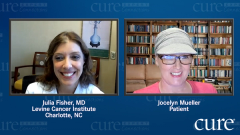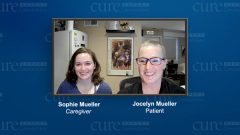
HER2-Targeting Post-Operative Treatment for Breast Cancer: The Patient Experience
Jocelyn Mueller describes the treatment process with sub-cutaneous HER2-targeting therapy post-operatively and some of the adjustments that she made to her daily life.
Episodes in this series

Jocelyn Mueller: Phesgo [pertuzumab/trastuzumab/hyaluronidase], I get subcutaneously every 3 weeks in my leg. I will get a total of 10 shots plus the 2 Herceptin [trastuzumab] and Perjeta [pertuzumab] infusions that I got before my pathology came back. I had 6 Herceptin and Perjeta treatments along with my chemo. So, my targeted therapy will be a total of 18 doses a year to administer, and I'll be finished in July of 2022. One of the nice things about switching, one of the great things about being done with chemo, was that suddenly my infusions had gone from 6 to 7-hour days to 3 to 4-hour days and with the Phesgo, it's 1 to 2 hours of my time. Most of that is the shot — they have to administer it over 5 minutes. So, they have to sit and slowly inject 2 teaspoons over a 5-minute period of time.
The first shot, you have to be observed for 30 minutes to make sure you've had no reaction, and then subsequent shots, you sit for 15 minutes after for observation. COVID didn't change my schedule so much, but there were staff shortages at the hospital. One of the times that I was there for just my Herceptin and Perjeta, the pharmacy was terribly understaffed and backed up. I think I was there for probably a solid 4 hours for a total infusion time of an hour, with no observation because they knew I was fine with that. It was more staffing issues than anything. A lot of my treatment, my family knows nothing about except what I've told them. Because of the pandemic, I haven't been able to have anyone with me. My husband could come to my appointments with me — and he did early in the process to meet with the doctors and find out what my treatment was going to be — but because of the pandemic, I haven't been able to have anyone with me at any of the infusions which made for long days. The nursing staff was great, they were friendly, and it was peaceful, but it also would have been nice to have family there. I haven't been able to do that, and I don't anticipate that anyone will throughout the rest of my targeted therapy either.
I haven't had many side effects from the shot. I do notice with the shot that I was having muscle pain in my legs, mouth sores, and dry lips about a week after the shot. There was also a metallic taste in my mouth that, to be honest with you, could have been happening during chemo, but there was so much else happening to my body that I don't remember it specifically as being an issue because you just are really trying to get through however you can. And then the injection site, they said I may have a rash, I may have pain, but I really haven't experienced any of that.
Sophie Mueller: I'll say about the mouth and taste issues with that metallic taste, that's another thing that we celebrate all the time is when we go to restaurants, or we get takeout from places –
Jocelyn Mueller: We don't go to restaurants.
Sophie Mueller: We don't go to restaurants but –
Jocelyn Mueller: Not yet.
Sophie Mueller: When we get takeout from places or when we cook something and it's something that she had during chemo versus now and she has this time to recover, it's always a celebration when she can taste something differently, or normally. Like our favorite taco truck, we had tacos a couple of weeks ago and it was a celebration when we did, and she could taste the food that I've been tasting the whole time. It was just a very happy thing to notice and keep track of.
Jocelyn Mueller: At the same time, there are things I don't think I will ever eat again because I ate them a fair amount during my chemo treatments, and they've been ruined for me. The association is just not pleasant. So, my follow-up now with my oncologist is every 6 weeks instead of every 3 which was what would happen during chemo. My care is still excellent. I do notice that there doesn't seem to be as much urgency to my care, and I asked my sister, who is a doctor, if I was imagining this. She said, "Absolutely not," and she said it's completely medically appropriate — their energy needs to be focused on patients who were where I was during chemo. I think it's nice to hear someone say, "Don't feel like you've been abandoned, but yes, you are going to notice that you're not their top priority," because you wanted to be their top priority during your chemo, and I definitely was. There are plenty of women going through this now that need to be the top priority, but while I say that they have been responsive and taking care of everything that I need, it just might not be as quickly as it was during my active chemo treatment.
Transcript edited for clarity.





